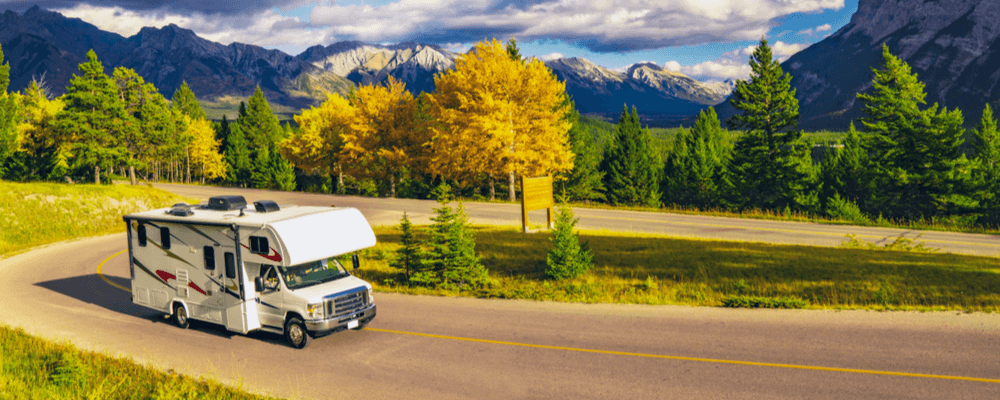
Whether you’re hitting the road in an RV for a road trip or it’s your new home on wheels, you can get peace of mind that you’ll be covered on your adventure with RV insurance.
Use this guide to:
- Learn about RV insurance coverage options
- Help determine what coverage you need
- Find the best RV insurance companies
- Learn how to save money on RV insurance
What does RV insurance cover?
RVs or motorhomes have unique insurance needs because they’re essentially both a home and a car. RV insurance combines the insurance needs of home and auto to fit the unique RV insurance needs.
RV insurance protects your equipment in the event of loss or damage just as an auto policy protects your vehicle. Moreover, similar to homeowners insurance, it may protect your personal belongings as well. RV policies protect your property in the event of an unforeseen circumstance such as: car accident, severe weather damage, pest infestation, theft or vandalism, and equipment damage.
Just like car and home insurance, there are standard RV insurance coverage options with optional coverage options that you can add to your policy. When shopping for the best RV insurance, consider factors such as your class of RV, how often you'll use it, and your state's minimum coverage requirements.
Standard RV insurance coverage
Below are a list of standard coverage options for RV insurance.
- Liability: Liability RV insurance covers the cost of injuries sustained by the other vehicle’s driver and passengers and property damage as a result of an accident that you were at fault for.
- Collision: Collision RV insurance coverage helps cover damage to your RV if it’s damaged in an accident with another vehicle or object.
- Comprehensive: Comprehensive RV insurance coverage covers damage to your RV that wasn’t caused by a collision. This can include if your RV is stolen or vandalized, if an animal causes damage, if a tree falls on your RV or if it’s damaged in a hailstorm or from other weather.
- Personal injury protection/medical payments: Personal injury protection (PIP) is required in no-fault states. PIP covers the cost of medical expenses, regardless of who is at fault in the accident.
- Uninsured/underinsured motorists coverage: Car insurance is required, but there are still drivers who break the law and drive without it. Uninsured or underinsured motorist protection covers you and your RV if the other driver doesn’t have insurance or doesn’t have enough insurance to pay for all injuries or damage.
Additional Coverage Options
Do you want or need more coverage for your RV or your personal belongings? The following coverage options are typical extra coverages that you can add to your RV insurance policy for an additional cost.
- Personal effects coverage: Whether you’re living in your RV or taking a road trip, you likely have personal belongings in your RV, such as sporting equipment, kitchen dishes, furniture and so on. Personal effects RV insurance coverage helps protect your items.
- Attached accessories coverage: Many RVs have attached accessories like an awning, satellite dish, water pump, generator and more. Attached accessories coverage makes sure all your items are covered in case they are damaged, destroyed or stolen. Attached accessories RV insurance coverage helps repair or replace these items.
- Roadside assistance and towing: Roadside assistance and towing coverage is important for your RV because it helps you in an emergency if your RV experiences mechanical breakdown or other issues, like if it has a dead battery, flat tire or needs to be towed to a repair shop. Roadside assistance and towing coverage can help you get back to your adventure quickly!
- Pet injury coverage: If you’re traveling in your RV with your pet, this coverage may give you peace of mind. It covers vet fees if your pet is injured while traveling in your RV. If you have pet insurance, be sure to check your policy because you may not need this if you already have pet insurance.
- Vacation liability coverage: Vacation liability coverage is available to protect you in case someone is injured inside your RV or you accidentally cause damage to another person’s RV. This coverage is important to consider because when your RV is considered a temporary vacation residence when you park it in an RV park or campground.
- Trip interruption insurance: If your journey is cut short because of an accident or mechanical problem with your RV, trip interruption insurance covers the cost of the remainder of your trip that you were unable to finish. This coverage reimburses you for your lost vacation.
- Rental reimbursement: If your RV is damaged and needs repairs, rental reimbursement helps cover the cost of a rental to help you get around.
- Gap insurance (loan/lease payoff): Gap insurance is available for those who have a loan for their RV or lease it. If your RV is totaled while you still owe money on it, gap insurance helps pay for the difference between what your RV is worth at the time it was totaled and what you owe on the RV’s loan or lease.
- Trailer and golf cart insurance: If you tow things with your RV like an extra trailer, golf cart, ATV, kayaks or other things, you can get extra coverage for physical damage of these belongings in case they fall off or become loose.
- Total replacement cost coverage: This is an optional RV insurance coverage that reimburses you for the cost to replace your RV rather than paying you the depreciated value of the RV. This coverage is great for newer RV models.
- Emergency expenses coverage: Many RV insurance companies offer this optional coverage that covers the cost of lodging or getting home if your RV is damaged and unusable.
Full-Time RV Coverage
If your RV is your primary residence, you’ll likely need extra coverage. RV owners who fall in this category typically have the following coverage options.
- High-limit personal liability: This offers you extended personal liability coverage limits, similar to limits included in home insurance.
- Medical payments: This covers the cost of medical payments for those injured in an accident.
- Loss assessment coverage: If you’re a member of an RV association, you may need to pay for losses of your shared space. This option covers that.
- Secured storage contents coverage: A lot of RV owners who live in their RV full time have a storage unit for their personal belongings that don’t fit in the RV. Secured storage contents coverage protects your belongings if kept in a storage facility.
What is excluded from RV insurance?
RVs give you the flexibility to travel anywhere the road takes you, but there may be some exclusions in your policy that you should be aware of. Some RV insurance companies only cover you in the U.S.. Therefore, if you cross over to Mexico or Canada with your RV, your RV insurance may not cover you while you travel outside the country.
Be sure to check your RV insurance policy to see if you have coverage in Canada and/or Mexico if you’re planning to travel to either or both of these countries. Some companies offer Mexico RV insurance for those planning to travel to Mexico in their RV. You can add this coverage to your policy if it doesn’t include it.
What kind of RV insurance do I need?
The best RV insurance for you depends on what type of RV you have and what you use it for. Typically, RV insurance requirements follow the same laws by state as car insurance requirements. In states where it’s required, you’ll need at least the minimum level of RV insurance to legally drive your RV.
If you have an RV that’s a motorhome and plan to drive it on the road, you need RV insurance. If you have a camper that you tow, your camper can be covered by your car insurance policy. There are three classes of RV motorhomes:
- Class A: Class A RVs are the largest. This class includes luxury coach RVs, converted busses and motor coach. Class A RVs are up to 75 feet long.
- Class B: Class B RVs are the smallest and most maneuverable kind of RV. These types of RVs are typically called camper vans and do not have a cabover. They have fewer amenities but can typically fit in a normal parking spot.
- Class C: Class C RVs are the middle of the road between Class A and B. They’re smaller than Class A but larger and have more amenities than Class B. Class C RVs use a standard cargo van with a camper part that extends over the cab area of the vehicle. This class also includes fifth wheels.
Class A RVs are much larger than the other classes and cost more money. They require more coverage than a Class B or C. How you use your RV also affects the level of coverage you need for RV insurance.
If you use your RV as a full-time primary home, you should look for full-timer RV insurance coverage that is effective all year long. This is the best RV insurance option for you because it gives you higher coverage limits and extended coverage to make sure you have all the coverage you need for your motorhome. You can also look at optional coverages that you can add to your RV insurance policy to receive extra coverage in certain areas as you need it.
If you use your RV for occasional road trips and don’t live in it full time, you can look at standard RV insurance coverage and adjust it if you need to by extending your coverage limits or adding extra coverage options to your policy.
Additionally, if you store your RV for an extended period of time (for example, if you only use your RV to travel in the summer), look into part-time RV insurance. This is sometimes called layover or storage RV insurance. Part-time RV insurance will reduce your premium for the times when your RV is stored and not used.
Do I need RV insurance if I rent an RV?
If you're planning to rent an RV, you still need RV rental insurance, regardless if you're renting from RV rental companies vs. marketplaces. It is illegal to operate a vehicle without insurance in most states so make sure you check with the organization you're renting from to see if they offer RV insurance.
How much does RV insurance cost?
Much like car insurance, the cost of RV insurance depends on a number of factors. Things that affect the cost of RV insurance include:
- Your age
- Your driving history
- Your gender
- Your credit score (in most states)
- Your marital status
- The type of RV you have (age, model and class)
- Where you store or park your RV
- How you use your RV (primary residence or used for vacations)
- The average number of days you expect to use your RV per year (typically grouped by either more than 150 days a year or less than 150 days a year)
- Where you live
The cost of RV insurance depends on the class and type of RV you have. The larger and more luxury style RVs cost more to insure. If you have a larger Class A RV, you’ll also likely have more personal belongings in your RV and need more insurance than if you had a smaller Class B RV.
RV Insurance Discounts
You can save money on your premiums with RV insurance discounts. Many of the RV insurance discounts available are similar to car insurance discounts like good driver discounts, discounts to those who own a home, bundling discounts and so on. You may also qualify for a discount if you’re a member of an RV association and if you take an RV safety course.
How can I find the best RV insurance company?
In order to find the best RV insurance, you should shop around and get RV insurance quotes from multiple RV insurance companies. A lot of the big-name car insurance companies offer RV insurance including Allstate, Farmers, Geico, Nationwide and Progressive.
When looking for the best RV insurance, be sure to talk to an insurance agent to help you find the best option. There are many different types of RVs that have different RV insurance needs. An insurance agent can help you find the best RV insurance for you and your RV’s needs.
There are some insurance agencies that specialize in RV insurance including RIS (Recreation Insurance Specialists), which manages the Blue Sky RV Insurance program, RV America and Good Sam RV insurance.
Good Sam RV Insurance
Good Sam is an Insurance Agency that specializes in RV insurance. Good Sam RV insurance can help you figure out your RV insurance needs and help you find the best RV insurance. Good Sam claims that RV owners who switch to the Good Sam RV Insurance agency save as much as $321 per year.
Do you have an RV? Let us know about your experience with your RV insurance company - whether it’s good or bad! Leave a comment in the comments section below.
The content on this site is offered only as a public service to the web community and does not constitute solicitation or provision of legal advice. This site should not be used as a substitute for obtaining legal advice from an insurance company or an attorney licensed or authorized to practice in your jurisdiction. You should always consult a suitably qualified attorney regarding any specific legal problem or matter. The comments and opinions expressed on this site are of the individual author and may not reflect the opinions of the insurance company or any individual attorney.

